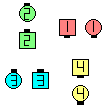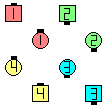A Twosome consists of two dancers
working as a unit and obeying the following set of rules:
- Throughout the given call, dancers retain their geographical
orientation in the square with respect to the other dancer in their
Twosome unit. This means that a dancer who started on the north side
of their Twosome unit must always remain on the north side throughout
the entire call.
- The two dancers in the Twosome unit are working as if they are one
dancer. Therefore, as with concepts such as
Tandem,
As Couples,
or
Solid,
never allow any other dancers to come
between or break up the Twosome unit. The dancers within the
Twosome unit must always be facing the same direction.
The caller will usually designate who is to work as a Twosome by saying
Couples Twosome, Tandem Twosome, or Siamese Twosome.
If it is unambiguous as to which dancers are paired, the caller may simply say Twosome.

| |

| before
(Siamese) Twosome Ah So | | after
|
|
 This is the starting formation
This is the starting formation
for each of the following: |
 after
after
Tandem Twosome
Single Wheel |
 after
after
Couples Twosome
Single Wheel |
- There are several ways to think about Twosome: the idea originated
from watching a pair of ice skaters doing 'shadow' maneuvers. While
the skaters move, they can make a complete 360° turn, and yet
the skater that started closest to the north side of the ring is
still closest to the north side of the ring, and the other skater is
closest to the south side of the ring.
- One could also imagine a bar suspended over the Twosome dancers with
strings attached to their heads like marionettes. The bar is rigid
and unbreakable and, like a compass needle, always points in the
same orientation. The dancers themselves can freely and individually
turn suspended on their own string, but they can not change the
direction in which the bar is oriented.
- Another way to think of Twosome is to imagine that the other dancer
in your Twosome unit is like your counterpart in another square. If
you start out as the #2 Lady, your counterpart in the adjacent
square is also the #2 Lady. As you execute each call, imagine
the other square moving closer and closer to your square, with your
counterpart eventually moving adjacent to you. Even though you are
both doing the exact same calls and movements, you can never switch
places into the other square, so your counterpart will always be on
the same side of you.
Dancing Hints: - Before doing a Twosome movement, check to see which wall you are
closest to, relative to the other dancer in your Twosome unit. After
completion of the movement, you should still be closest to that wall.
- When dancing as a Twosome, do not firmly connect with the other dancer
in your unit as you would with As Couples (holding adjacent hands) or
In Tandem (placing a hand on the Leader's back). If you physically
connect with the other dancer, you will be unable to dance properly
since there will be a strong tendency to turn as a (solid) unit. When
dancing Twosome, turning movements are always done individually!
- When I dance Twosome, I concentrate on not letting the other dancer get past me
to my closest wall. I pretend I'm trying to keep my wife, with my
credit card, from entering a fancy department store.
Since all calls can ultimately be broken down into a few simple movements
(such as individually turn 1/4 Right|Left, Hinge, etc.), dancers
should thoroughly understand how to do the following basic Twosome movements:
-
Twosome Roll, 1/4 Right, 1/4 Left, or U-Turn Back:
- Individually do the given call (since these calls are done in place).
-
Tandem Twosome Hinge:
- From a Mini-Wave Box: Follow Thru.
- From Tandem Couples: 1/4 In; Veer Left.
-
Couples Twosome Hinge:
- From a One-Faced Line: 1/2 Tag.
- From a Two-Faced Line: Any Shoulder 1/2 Tag.
{n}-some (or 1 By {n}-some) [C4]:
(where n is usually 3 or 4): n dancers, who must be relatively close to
each other (having no other dancers between them) and facing toward the same
direction, work as a unit following the rules for Twosome.

| |

| before
1 By 3-Some Switch To A Diamond | | after
|
|
The above example could also be called as: Inside Triangle work 3-some: all Switch To A Diamond.
Note: Be aware that the term 4-some may sometimes be used in
circumstances not related to Twosome. For example, the caller might say 'Each
4-some' to tell the dancers on each side of the set to work together. Another
example of this is when some callers use the term 'Interlocked Foursome'
when they should use a more explicit term such as 'Interlocked Box'.
Skewsome CONCEPT [C4] (Vic Ceder 1989):
Diagonal dancers work as a Twosome.
|
Dancers in a Skewsome unit:

| |
or | |

|
|
Boxsome CONCEPT [C4]:
A 2 x 2 Matrix of dancers and phantoms work as a 4-some.
This concept is used from a 2n x 2m Matrix (usually 2 x 8 or 4 x 4),
and is typically called as 'In Your 4 x 4 Matrix: work Boxsome...'
|
Skewsome | Boxsome Peel & Trail:

| |

| before
Skewsome Peel & Trail | | after
|
|
Gruesome Twosome CONCEPT [C4]:
Usually from a 2 x 8.
Same as Phantom Couples Twosome working in Parallel Waves.
Also known as Couples Twosome Phantom Waves.
 This is the starting formation
This is the starting formation after
after after
after